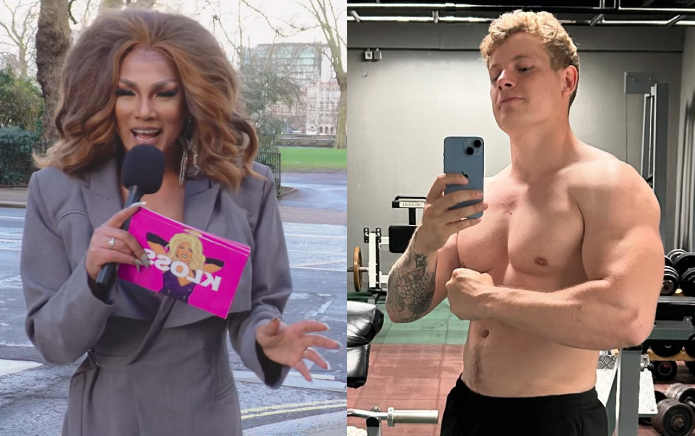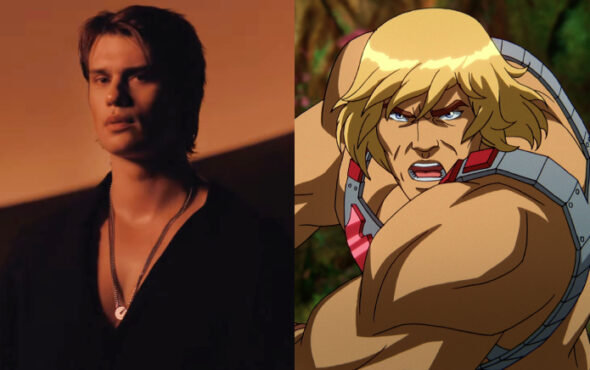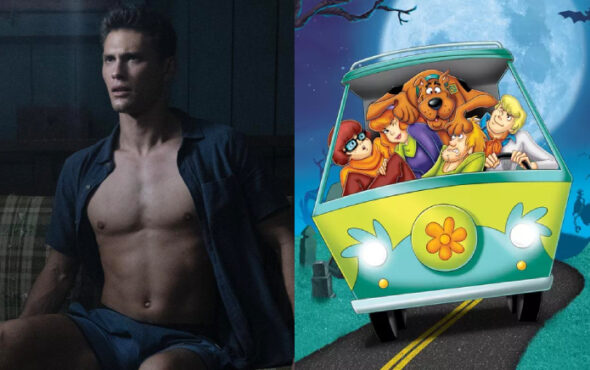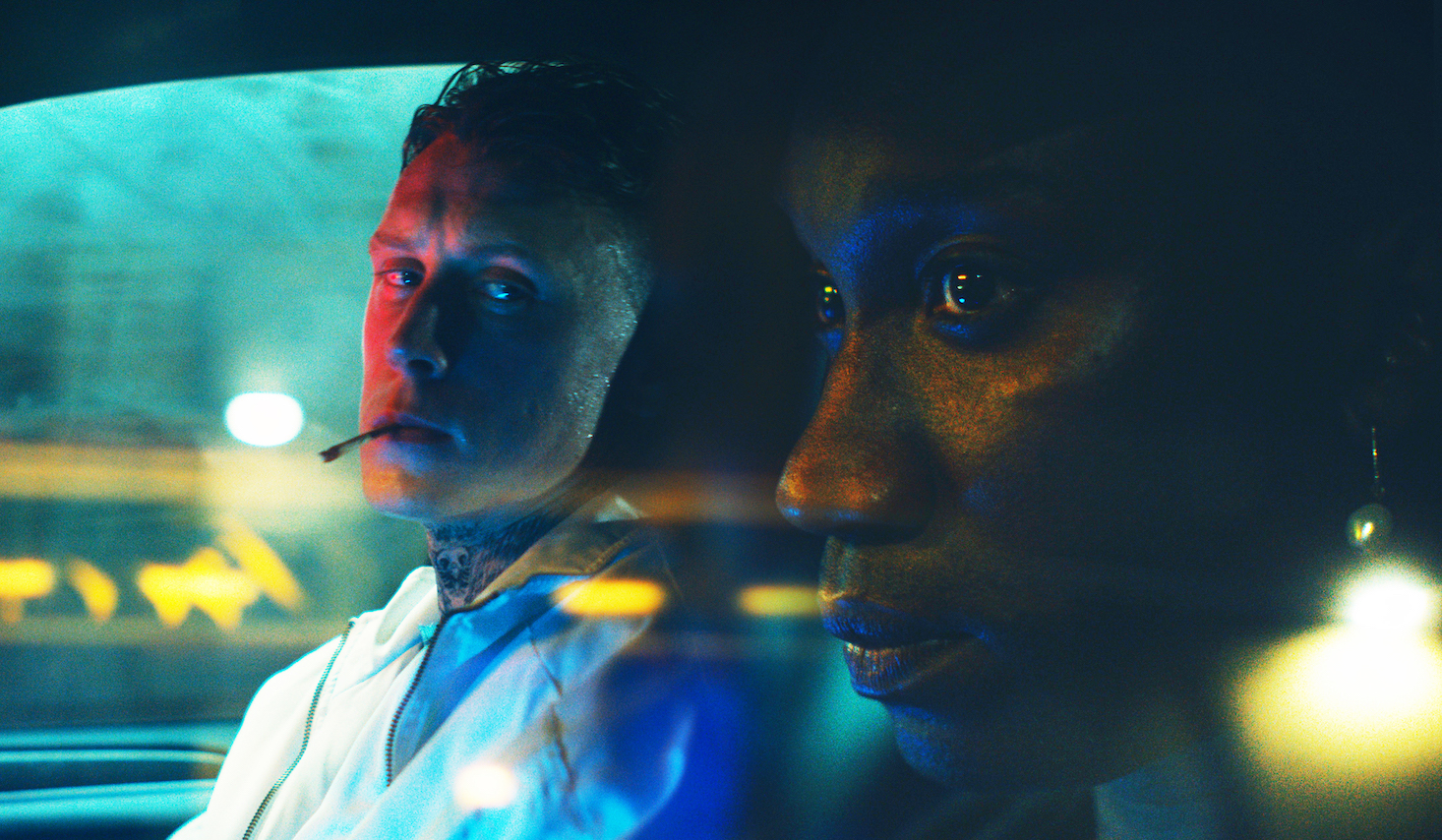
In the opening scenes of erotic thriller FEMME, Jules is the target of an orchestrated homophobic attack in an East London off-licence store, a harrowing moment that leaves Jules bloody and traumatised. Months later, no longer dressed as his glam drag alter ego, Aphrodite, Jules encounters his attacker, Preston, at a gay sauna. Suddenly, Sam H. Freeman and Ng Choon Ping’s gripping feature debut transforms into a queer revenge psychodrama, as Jules and Preston wrestle with sexuality, trauma and desire.
Based on their 2021 short film of the same name, FEMME is “a revenge story about reclaiming agency”, co-director Freeman says. When I sat down with London-based co-directors Sam H. Freeman and Ng Choon Ping in late December of 2023, they were still reeling from their wins at the British Independent Film Awards (BIFA) earlier that month. Their queer spin on the classic femme fatale trope landed their debut feature film Best Joint Lead Performance, Best Costume Design and Best Make-Up & Hair Design. Since premiering at the 2023 edition of the lauded Berlinale International Film Festival, FEMME has toured to film festivals across the globe, garnering praise for its ability to subvert gender and portray queer characters in positions of power.
In FEMME, the sentiment of feeling unsafe for presenting in a gender non- conforming way is echoed. Starring Nathan Stewart-Jarrett as an effeminate Jules and George MacKay as the hyper-masculine Preston, the film takes audiences on a journey through the power struggle between a liberated and a closeted protagonist and how they assert dominance over each other. While the film depicts a myriad of queer experiences, it also presents the raw human emotion that accompanies coming to terms with loss, mistrust and betrayal. “You don’t need to be queer to empathise with what this queer character is feeling,” Ng remarks, referencing the struggles Jules faces following his attack.
FEMME subverts and challenges what audiences believe queer film should be. The film poses the question: ‘What if, instead of suffering quietly, the protagonist takes a dark path to grasp his agency?’ Unlike other queer films that have toed the deep-seated industry line, FEMME forgoes the pressure to assimilate into the wider culture and rejects predetermined ideas of how characters are allowed to regain their power. “As queer storytellers, we find queer joy to be really important. And we consume a lot of those stories ourselves. But we needed to step out of that box and tell a new sort of story that falls into a different genre of film,” Freeman shares. The pair wanted to reimagine queer cinema by telling stories beyond those that centre characters coming out or silently suffering before arriving at their sought-after reconciliation.
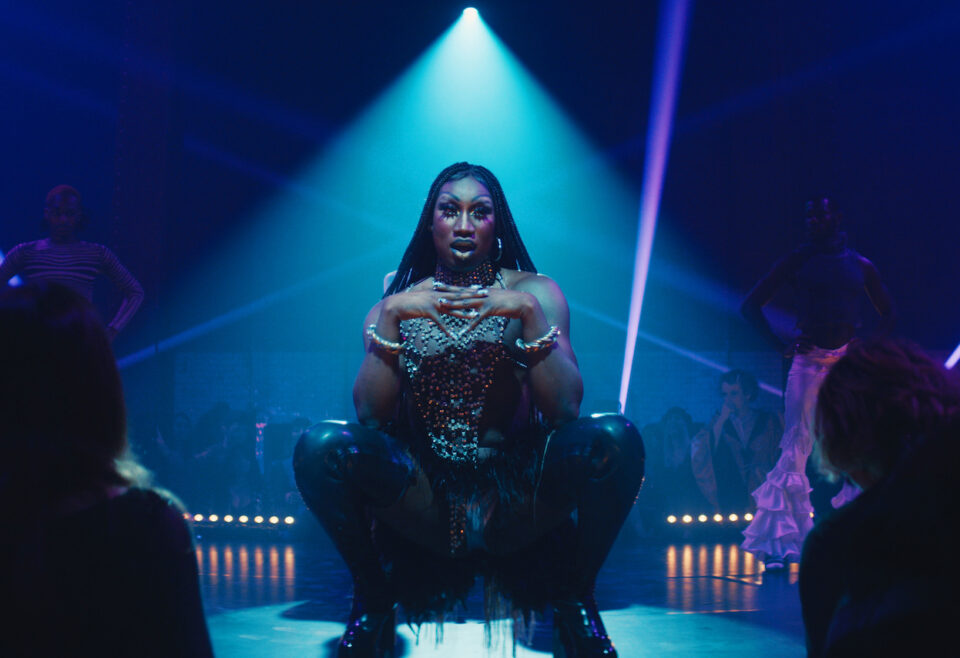
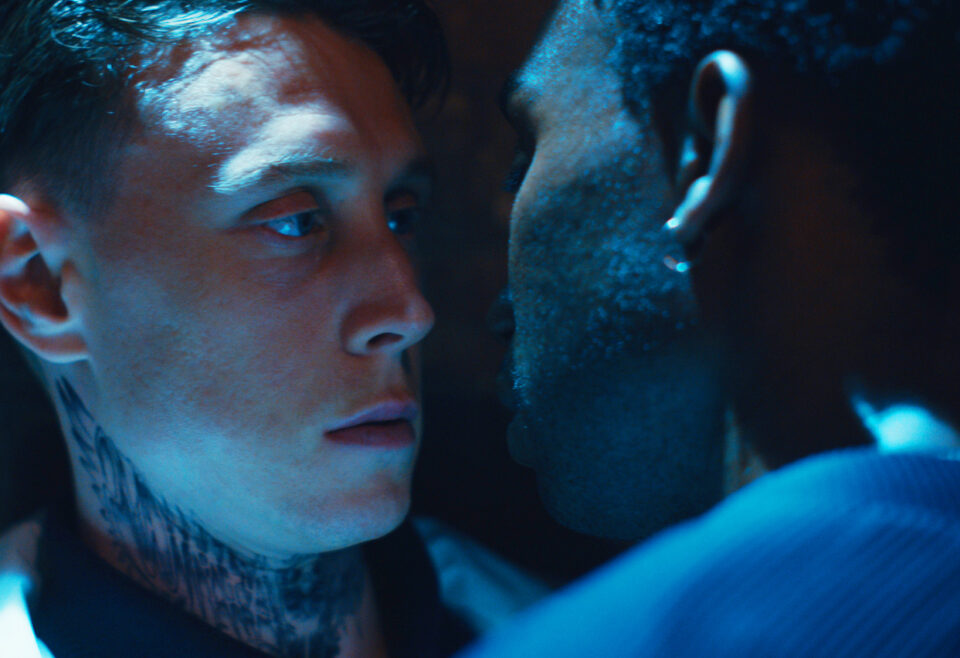
While ruminating on the idea for the film, Freeman and Ng were faced with arguments around the ethics of the film: how could they run the risk of portraying violence against marginalised communities and, in turn, potentially retrigger and re-traumatise folks who have faced similar experiences? “The film explores the idea of heterophobia,” Freeman reveals. “We realised that whenever we felt anxious in the world, it was due to ending up in a place that felt exclusively heterosexual and overtly masculine. It’s when you start to think: ‘I don’t quite fit in here, I can’t quite access this conversation.’”
When dealing with themes around sexuality and gender, the film aims to reflect queer experiences and spaces authentically, such as the gay sauna in which Jules and Preston reacquaint themselves. In too many films, gay saunas are represented as dangerous, deviant places, and while some of them may fit that brief, Freeman and Ng aimed to condemn the predatory nature that is often projected onto cruising spaces by hetero filmmakers. FEMME flips this very trope on its head, portraying the sauna as a safe meeting place in which consent is respected. The reality is that the space only becomes unsafe when Preston arrives.
The attack that’s depicted in the opening scenes of the film echoes the tragic reality many queer people face when walking the streets of the cities they call home. Across the UK in 2023, queerphobic attacks were on the rise. According to UK charity Stonewall, the Government’s National LGBT Survey revealed that less than one in ten LGBTQIA+ people report hate crimes or incidents. In addition, hate crimes on the basis of sexual orientation have risen by a shocking 112% in the last five years. This is, sadly, unsurprising, considering that the UK has been subjected to a decade-and-a-half- long tirade of a conservative-led constitution. Under the thumb of the Tory government and their relentless push for anti-LGBTQIA+ legislation, 2024 feels like an unsafe time to be visibly queer. But for many, masking our queer identity and opting to present as more straight-passing isn’t an option.
Putting their own spin on queer cinema has been a long time in the making for Freeman and Ng. After meeting back in university almost a decade ago, the pair hit it off and soon became good friends, bonding over a mutual appreciation for sci-fi and Dungeons and Dragons. At the time, Freeman was working as a screenwriter and Ng a theatre director. While roommates, the pair toyed with the idea of working on something together. “We were frustrated and feeling excluded from a part of the film industry we really connected with. It was a [straight] boys’ club that we weren’t allowed into and couldn’t even imagine ourselves in,” Freeman shares, reflecting on the gatekept neo-noir thriller corner of the film industry. As first-timers looking to write and direct a film, they were advised to develop their idea into a short film as a proof of concept that would help rally excitement and prospective funding. What emerged was their 2021 BIFA-winning and BAFTA-nominated short of the same name.
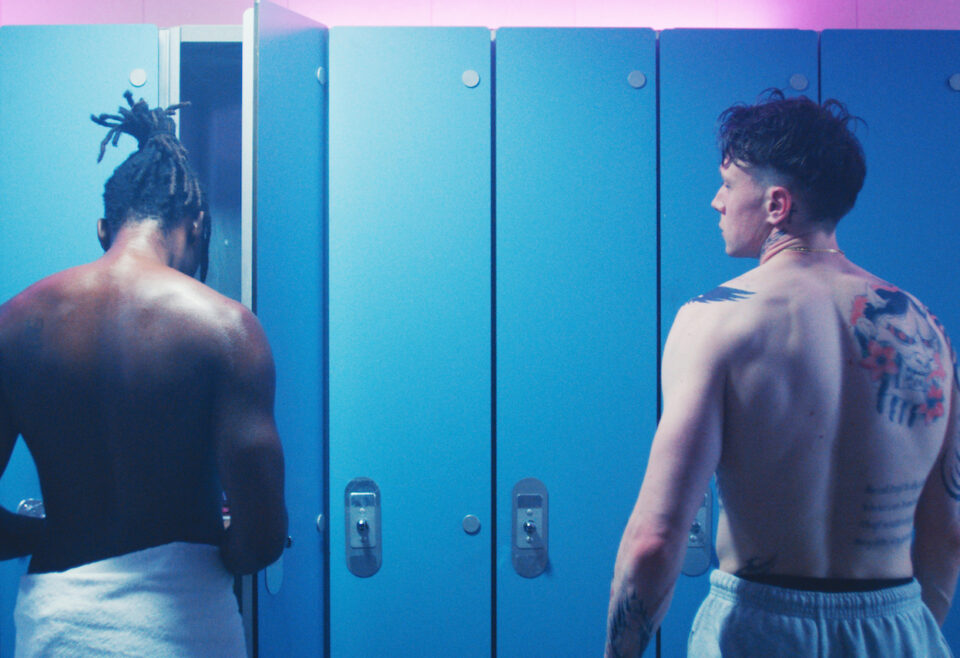
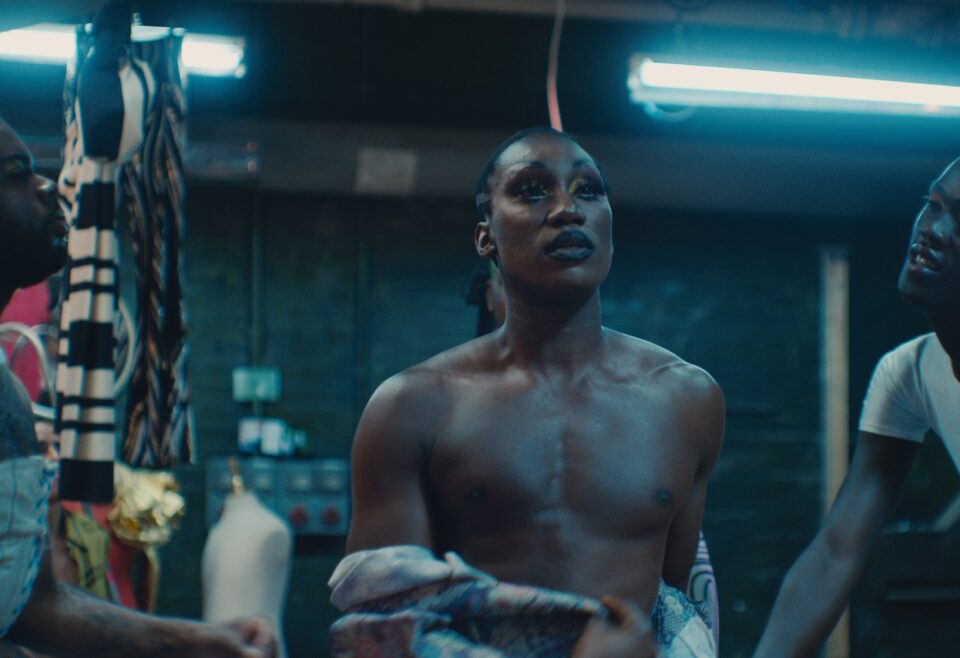
For the directors, it was paramount that the film took care to avoid harmful stereotypes, while establishing unrelenting storytelling. “One of the great successes of the film is that everyone who watches it comes out saying ‘I was so scared,’” Freeman shares. Here, audiences are captured by Jules’ fear – “They’re in his head experiencing heterophobia first-hand.” So, when we witness him brutally beaten, as Aphrodite, by a gang of men, its cruelty resonates, in some way, with viewers. “The idea of having a drag queen who loses their power and then reverts to becoming a drag king to enact their revenge on the people who took it away is the dark, twisted narrative we wanted this film to explore,” Freeman says.
As Jules and Preston’s dynamic becomes increasingly complicated and dark, FEMME sheds the good-bad binary and gives way to nuanced, layered character arcs. As Ng notes, cinema suffers due to the lack of powerful queer protagonists. In order to bring more realism to the role, the directors brought on Drag Race UK alum Jonbers Blonde to carry over character authenticity to the big screen, while maintaining the feeling of safety for the actors. Blonde stepped up as drag mother to lend their charisma, uniqueness, nerve, and talent (C.U.N.T) to coach Stewart-Jarrett through the role of Aphrodite. Meanwhile, Robbie Taylor Hunt, an intimacy director and coordinator who specialises in queer intimacy on screen, ensured the cast felt safe throughout filming.
For Freeman and Ng, representing characters authentically was equally important as their choice to genuinely portray the shifts in power throughout the protagonists’ relationship. As the film progresses, FEMME’s distinction between the hero and the villain becomes more and more blurred. It’s clear that Jules is, in fact, the anti- hero, and all of the characters carry their own flaws, which render them irrefutably unlikeable. “Nothing in the film is binary, be that gender or sexuality,” Freeman shares. “Even the binaries that define what a hero and villain is aren’t particularly interesting to us.” Ng chimes in, adding, “It’s just not realistic or satisfying to have clear-cut villains and heroes.”
